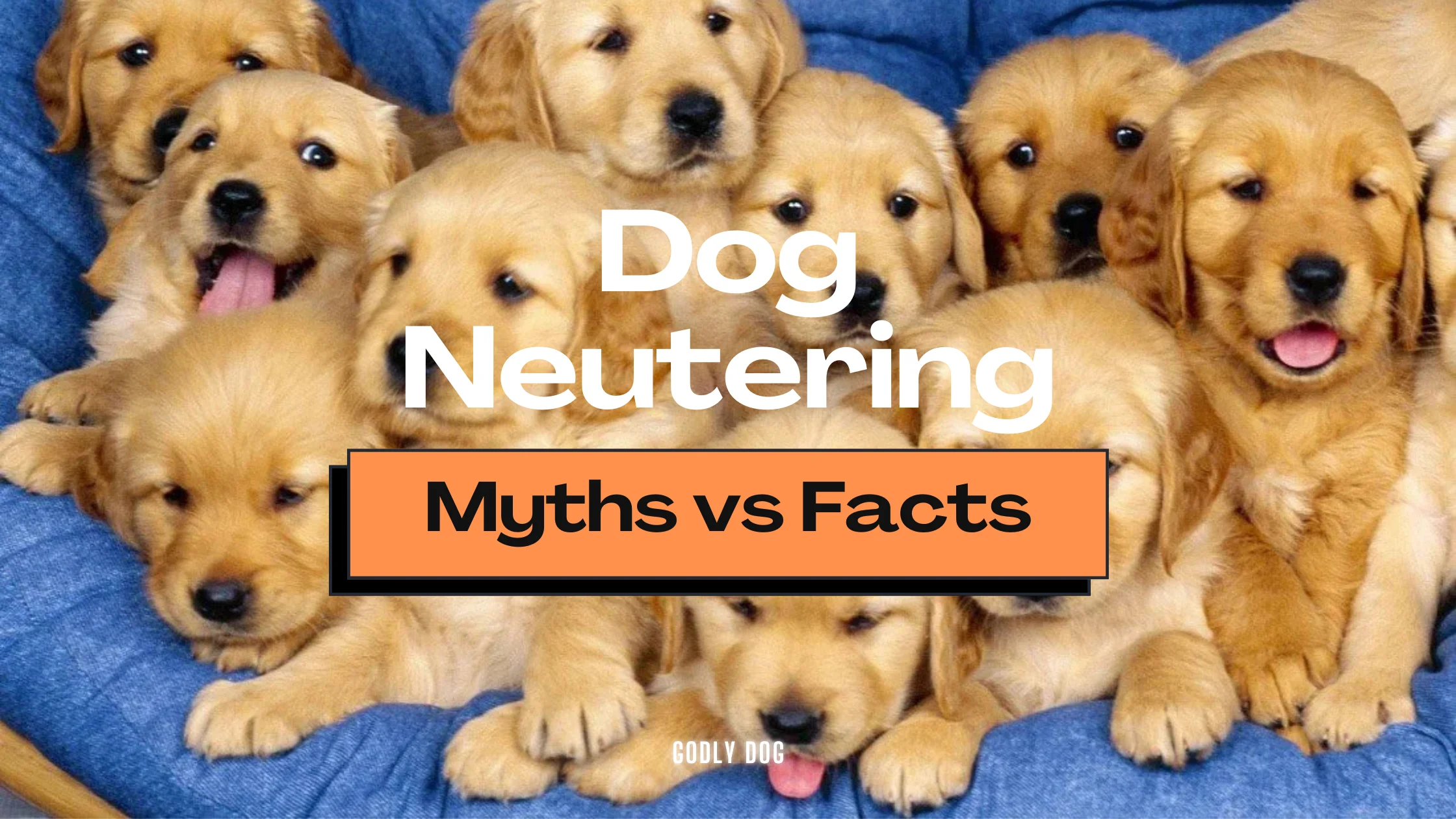Dog Neutering: Myths vs Facts

Categories :
- Dog neutering—a decision that’s almost as tough as choosing between crunchy or soft tacos, but more important! If you’ve ever found yourself wondering whether neutering is the right choice for your furry companion, you’re not alone. As dog parents, we all want the best for our pups, but when it comes to neutering, the myths and confusion can leave us scratching our heads more than a dog with fleas. Is it cruel? Will my dog suddenly become a couch potato? Does neutering have some hidden, mysterious downside? If you’ve ever asked any of these questions (or just want to know the truth), you’ve come to the right place.
- In this blog, we’re going to bust these myths wide open, replacing them with cold, hard facts to help you make an informed, confident decision for your dog. So sit back, grab your pup’s favorite chew toy (or maybe a cup of coffee), and let’s dive into the world of dog neutering—myths, facts, and everything in between!
What is Dog Neutering?
- Before we dive into debunking the myths, let’s take a moment to clarify exactly what neutering is—and what it isn’t. If you’re still a bit fuzzy on the details (don’t worry, we’ve all been there), here’s a simple breakdown.
- Neutering is a surgical procedure in which the reproductive organs of a dog are removed. For male dogs, it involves removing the testicles, and this procedure is often referred to as “castration.” For female dogs, the equivalent is called “spaying,” where the ovaries and usually the uterus are removed. It’s a common, straightforward procedure that has significant health and behavioral benefits for your dog.
Why Neuter Your Dog?
- The primary reason most pet parents choose to neuter their dog is to prevent unwanted litters. We all love puppies, but there are simply not enough homes to go around for the countless adorable little ones born every day. Neutering your dog ensures that they won’t contribute to the overpopulation problem, and it can also help in reducing the number of dogs in shelters waiting for homes.
- But the benefits don’t stop there! Neutering is about more than just controlling the dog population. It can improve your dog’s health, prevent certain medical issues, and even contribute to better behavior. For example, neutering a male dog reduces the risk of testicular cancer, prostate problems, and can even curb behaviors like territorial marking or roaming. It’s not just about preventing puppies—it’s about giving your dog a healthier, longer life. Check out my detailed article on all the neutering benefits specific to both male and female dogs, highly recommend it.
Common Myths About Dog Neutering
- Now that we’ve got the basics covered, let’s get into the myths! Like any hotly debated topic, neutering has its fair share of rumors, misunderstandings, and downright funny ideas floating around. These myths can be confusing and even make well-meaning pet parents second-guess their decision. So, let’s take a look at some of the most common myths and set the record straight with the facts!
Myth 1: Neutering Will Change My Dog’s Personality
- Fact: Neutering affects hormones, not personality.
- Ah, the myth that neutering will turn your dog into a different dog altogether—perhaps a lazy, disinterested, or super chill version of their former self. Not true! Neutering does affect hormone levels (goodbye, testosterone), but it doesn’t change your dog’s personality. Your dog will still be the same goofy, playful, and loving companion that you know and adore.
- If your dog is energetic, mischievous, or a little bit of a troublemaker before the procedure (hey, no judgment here!), they’ll still be that way after neutering. What neutering can do is reduce hormone-driven behaviors like marking, aggression, or wandering in search of a mate. So, while it may bring some behavior improvements, it won’t turn your dog into a completely different creature. They’ll still be the same quirky companion they were before—you just won’t have to worry about them trying to start a doggy family on the side!
Myth 2: Neutering Will Make My Dog Fat and Lazy
- Fact: Weight gain depends on diet and exercise.
- This one’s a classic. Some people believe that neutering will turn their dog into a couch potato with a side of extra weight. The truth is, weight gain in neutered dogs is not an automatic outcome. The real culprit here is the combination of diet and exercise.
- Neutering can slightly decrease a dog’s metabolism, but that doesn’t mean they’ll start packing on the pounds right away. As long as you continue to provide your dog with regular exercise and a balanced diet, they won’t suddenly balloon into a lazy, overweight version of themselves. In fact, keeping your dog active and on a healthy feeding schedule is the key to preventing weight gain. So, if your dog loves their daily walks and playtime, neutering won’t make them lazy—just keep the routine, and your dog will stay fit and happy!
Myth 3: Neutering is Cruel and Unnecessary
- Fact: Neutering can prevent health problems like testicular cancer and prostate issues.
- Some people argue that neutering is cruel and unnecessary, often fueled by misinformation or the idea that “dogs should be allowed to be dogs.” But in reality, neutering can significantly benefit your dog’s health and overall well-being. For males, neutering eliminates the risk of testicular cancer (a serious and sometimes fatal condition) and can reduce the likelihood of prostate issues later in life.
- Neutering is also about preventing behaviors that are driven by hormones, like aggressive tendencies or the urge to roam in search of a mate. Neutering is a responsible choice that can add years to your dog’s life and prevent costly health problems down the line, so it’s far from unnecessary.
- And contrary to what some might think, neutering is a safe and routine procedure performed by professionals who take great care in ensuring your dog is comfortable and well-cared-for during the process. So, instead, think of it as a proactive step toward improving your dog’s health!
Myth 4: It’s Better to Let My Dog Have One Litter Before Neutering
- Fact: This has no medical benefit.
- Another myth that some people believe is that letting your dog have one litter before neutering will somehow benefit their health. While this might have been passed down through word of mouth, it’s simply not true.
- There is no medical benefit to letting your dog have a litter before neutering. In fact, this can contribute to the overpopulation problem, and it doesn’t offer any health advantages for your dog. Spaying or neutering your dog at the right age can prevent a variety of health problems, such as uterine infections, testicular cancer, and unwanted behaviors. And let’s not forget that there are already millions of dogs in shelters looking for homes—further litters just add to the pet overpopulation issue.
- So, don’t buy into the myth that your dog needs to “experience parenthood” before being neutered. They’re better off being spayed or neutered early for their health and the health of the community!
Myth 5: Dog Neutering is Too Expensive
- Fact: There are affordable options and long-term savings.
- While it’s true that there’s a cost associated with neutering, the price is often much lower than people expect, especially when compared to the long-term benefits. Neutering is a one-time expense, and many vets offer low-cost options through clinics, animal shelters, or nonprofit organizations.
- When you think about the potential health problems that neutering can prevent, it quickly becomes clear that neutering is a cost-effective option in the long run. For example, treating testicular cancer or prostate issues can cost thousands of dollars, whereas neutering is a fraction of that. Plus, reducing the likelihood of behavioral issues, such as roaming or aggression, can save you from the headache of managing unwanted behaviors or damage to your property.
- So, while it might seem like an investment upfront, neutering is a financially savvy choice that can save you a lot of money in the future. And don’t forget, neutering helps control the pet population, which benefits everyone in the community!
- Now that we’ve debunked some of the most common dog neutering myths, it’s clear that neutering your dog is a safe, healthy, and responsible decision. It’s not just about preventing litters; it’s about ensuring your dog’s well-being and preventing health problems down the road.

Dog Neutering FAQs
- By now, we’ve cleared up the major myths surrounding dog neutering, but we know that pet parents still have questions. After all, neutering is a big decision, and it’s natural to want all the facts before you make the choice for your dog. Here are some of the most common questions people ask about dog neutering, along with the answers you need to feel confident and informed.
Does Neutering Hurt My Dog?
- It’s natural to be concerned about your dog’s comfort, and the word “surgery” alone might make you anxious. But here’s the good news: neutering is a routine, relatively simple procedure. Most dogs are put under general anesthesia, so they won’t feel any pain during the surgery itself. Afterward, you may notice your dog being a little groggy, but they will typically recover quite quickly.
- There will be a brief period of post-surgical discomfort, but your vet will prescribe pain relief to keep your dog comfortable during recovery. By following the aftercare instructions (such as limiting physical activity for a short time), your dog will be back to their regular routine in no time.
What’s the Neutering Recovery Process Like?
- Recovery from neutering is generally quick and easy for most dogs. After the surgery, your dog will need to rest for a few days to allow their body to heal. They may be a bit sleepy or disoriented right after the procedure (thanks to the anesthesia), but this should pass within a few hours.
- Your vet will likely recommend limiting playtime, running, or jumping for a week or so to prevent the surgical site from becoming irritated or infected. Most dogs feel back to normal within a few days, and the stitches (if they’re not the dissolving type) are typically removed within 10-14 days. It’s also a good idea to keep your dog from licking the incision area, so a cone or an alternative protective collar might be needed for a short time.
At What Age Should I Neuter My Dog?
- This is one of the most debated questions when it comes to neutering! Generally, the best time to neuter your dog is between 6-9 months old. However, the ideal age can vary based on breed, size, and individual health factors.
- For smaller dogs, neutering at around 6 months is usually recommended. Larger breeds might benefit from waiting a little longer to allow their bones and joints to develop fully, as early neutering can sometimes be linked to an increased risk of certain joint problems in large dogs. Your vet will be the best person to give you personalized advice based on your dog’s breed and size.
Are There Alternatives to Neutering?
- Some dog parents look for alternatives to neutering for various reasons, whether it’s concerns over surgery or the desire to keep their dog intact for breeding purposes. While there are a few alternatives—such as chemical castration or hormone treatments—these options are typically not as effective or permanent as surgical neutering.
- In some cases, chemical castration can reduce testosterone levels temporarily, but the effects wear off, and the procedure might need to be repeated. Additionally, hormone treatments come with their own set of risks and side effects, and they are usually not as reliable as the surgical route. If you’re looking for a permanent solution to avoid unwanted litters, neutering remains the most effective and safest option.
What Happens During the Neutering Procedure?
- Here’s a quick breakdown of what you can expect:
- Anesthesia: Your dog will be given anesthesia to ensure they’re completely unconscious and pain-free during the surgery.
- The Surgery: For males, the vet will make a small incision to remove the testicles. For females, the procedure is a bit more invasive (removing the ovaries and usually the uterus). The incision will be stitched up after the organs are removed.
- Recovery: Your dog will be monitored while they wake up from the anesthesia. Most dogs are allowed to go home the same day, though they might be a little groggy for a few hours.
- Aftercare: You’ll need to keep an eye on your dog’s incision site, make sure they don’t lick or bite the area, and follow the vet’s instructions on activity levels.
- The whole process is quick, and most dogs recover without any issues. Of course, always follow your vet’s advice on aftercare for the best results.
What Are The Various Neutering Options Available?
There are several neutering options available, each with its own considerations. These include:
- Castration
- Vasectomy
- Zeutering
- Ovariohysterectomy
- Ovariectomy
- Hysterectomy
- Tubal Ligation
- Laparoscopic Neutering
- Canine Hormonal Down-regulation
- Immunocontraception
For a detailed explanation of each procedure, their pros, and cons, check out my comprehensive blog 10 Dog Neutering Options You Need to Know.
- These are just a few of the most frequently asked questions about dog neutering, but remember, each dog is unique. If you still have concerns, it’s always a good idea to chat with your vet, who can provide advice tailored specifically to your dog’s needs.
Conclusion: Busting Dog Neutering Myths, Helping Dogs Live Their Best Lives
- In this blog, we’ve busted some of the most common myths about dog neutering and highlighted the facts every pet parent should know. Neutering isn’t about changing your dog’s personality or making them lazy—it’s about promoting their long-term health and well-being. From preventing certain cancers to reducing unwanted behaviors like aggression and roaming, neutering is a responsible choice that benefits both your dog and the larger community by helping control the pet population.
- It’s natural to have emotional concerns, but remember, neutering is a safe, routine procedure that’s backed by veterinary expertise. If you’re unsure, consulting your vet for personalized advice is always a good idea.
- At the end of the day, neutering your dog is a step toward a healthier, happier life for them. So, if you’re still on the fence, take the plunge—you’ll be making a positive, lasting impact on your dog’s future.

Srijana, founder of Godly Dog, brings 12+ years of experience caring for dogs, including her 6 fur kids: a Labrador, 2 Spitz, and 3 Indie rescues. She has studied natural dog nutrition and behavior to better understand and care for them. A passionate advocate for strays and a dedicated volunteer, she believes dogs embody godliness, inspiring unconditional love and selflessness. Through Godly Dog, she shares practical advice to ensure every dog gets the love, care, and respect they deserve.



